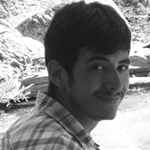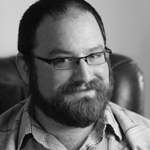FIVE POEMS
Brenda Hillman, "Sky of Omens, Floor of Fragments"
Marcelo Hernandez Castillo, "Peach Harvest"
Linda Jaffe, "Evensong"
Brent Calderwood, "Nocturne"
Brian Teare, "Three Cocks"
About Squaw Valley Community of Writers
Sky of Omens, Floor of Fragments
& the sound in the field
was an abstract sound—
it went nnnn~~uuuuuuooo
(might have been some mixed-genre insect
going on to help nature—)
* * * *
Some of the munitions manufacturers also make prosthetic devices for women vets. Complaints had been filed since 2005 that the arms & legs were all sized for men. Now the Pentagon is wising up because, bullet point, 14% of the active forces are females & also, bullet point, 11% are combat forces, which is expected to increase in the future, plus half of this population are women of childbearing age. Now there seems to be more attention to making the artificial limbs smaller, but also to make uniform wigs, mastectomy bras & other prosthetics. Representatives attend to surveys, cost trends. The VA website shows a woman stirring chocolate cake batter with her new arm made of a steel bar with a strap. Here’s another graphic from the site:

* * * *
Natura. To be born. To have
a “kynd.” It is in my nature to cry about war.
i don’t usually melt down like this anymore, usually
i feel furious enough to take action. When the President
speaks calmly about drone-bombing, he could cite
King David: For I am useless as a broken pot,
Psalm 31. Our ex-boyfriend America
is sleeping with Lockheed. In the dream, i float
downward. The spirit guides wait outside the human.
& if in the white cave of this depression
the old wound advanced itself—what then?
 is the author of eight collections of poetry, all published by Wesleyan University Press, the most recent of which are Cascadia (2001) and Pieces of Air in the Epic (2005), which received the William Carlos Williams Prize for Poetry, and Practical Water (2009). She has also published three chapbooks. With Patricia Dienstfrey, she edited The Grand Permission: New Writings on Poetics and Motherhood (Wesleyan, 2003). Hillman teaches at St. Mary’s College where she is the Olivia Filippi Professor of Poetry; she works with CodePink, a social justice group against war and lives in the San Francisco Bay Area.
is the author of eight collections of poetry, all published by Wesleyan University Press, the most recent of which are Cascadia (2001) and Pieces of Air in the Epic (2005), which received the William Carlos Williams Prize for Poetry, and Practical Water (2009). She has also published three chapbooks. With Patricia Dienstfrey, she edited The Grand Permission: New Writings on Poetics and Motherhood (Wesleyan, 2003). Hillman teaches at St. Mary’s College where she is the Olivia Filippi Professor of Poetry; she works with CodePink, a social justice group against war and lives in the San Francisco Bay Area.
![]()
If the shadows of delta mud crack
under what can only be
the afternoon sun sinking
to the surface of someone else’s sky,
then they were never shadows to begin with.
I wrote many letters
in that sulfurous afternoon heat
after picking the sometimes hidden bulbs,
streaks of orange in a thicket of leaves
that must have been rosemary peaches.
This is how poems begin,
this is exactly how a poem should end:
with a cross-net plastic sack
of peaches glistening not
from mist sprayed to hide their age,
but from a deeper understanding
that comes from the senseless repetitions
in those mornings when anyone’s body
is mapped so well in the corridors
of memory that even blind,
we can read the subtle whimpers
of the one nearest us, not as braille,
as you would expect, but as the hard
hesitations of certainty.
This is exactly how a poem should end,
with the beginnings that creep upon us
like shadows hardening into delta mud
as a form of meditation.
 , who was born and raised in Yuba City, California, studies creative writing at California State University Sacramento. He is currently the poetry section editor for Calaveras Station Literary Journal, and with Robert Hass he is editor of the Squaw Valley Review 2011. He was a Bazzannela Literary Award winner for 2010 and has received scholarships from the Warmdal and Willhelm Memorial Scholarship fund and the Squaw Valley Community of Writers. His work appears in Carcinogenic Poetry, The Legendary, Sex and Murder Magazine, Softblow Review, Puffin Circus, Psychic Meatloaf, and Calaveras Station among others. He works as a handyman and is recently married.
, who was born and raised in Yuba City, California, studies creative writing at California State University Sacramento. He is currently the poetry section editor for Calaveras Station Literary Journal, and with Robert Hass he is editor of the Squaw Valley Review 2011. He was a Bazzannela Literary Award winner for 2010 and has received scholarships from the Warmdal and Willhelm Memorial Scholarship fund and the Squaw Valley Community of Writers. His work appears in Carcinogenic Poetry, The Legendary, Sex and Murder Magazine, Softblow Review, Puffin Circus, Psychic Meatloaf, and Calaveras Station among others. He works as a handyman and is recently married.
Nowhere more than here
will the constellations drift more bereft
amidst parcels of night, black kernels
meted out by each toll of the plateia’s bell.
Tonight my longing is an ancient city, wound
on itself, it leads me again to that courtyard
where bougainvillea once rustled outside our open window
rebetika drifting up from Plessa’s Taverna ― how
like Cretan girls we danced our circle dance, light
crisscrossing your cheek until I moaned.
Like one who has lost her mother tongue,
only breath conveys this fallow night.
 has published her work in Switchback, Generations, Bitterroot, and Systemic Zoology. She received her MFA in writing from the University of San Francisco. Born in Los Angeles, she currently lives in Berkeley with her husband and decrepit boxer, where she teaches math and science. When not writing and teaching, she spends her time reading, traveling, cooking, and stirring up mischief.
has published her work in Switchback, Generations, Bitterroot, and Systemic Zoology. She received her MFA in writing from the University of San Francisco. Born in Los Angeles, she currently lives in Berkeley with her husband and decrepit boxer, where she teaches math and science. When not writing and teaching, she spends her time reading, traveling, cooking, and stirring up mischief.
![]()
“Perhaps it is better to wake up after all, even to suffer,
rather than to remain a dupe to illusions all one’s life.”
—Kate Chopin, The Awakening
In dreams, you read my poems, I’m never in bed
past noon, no one snores. I still cook the same
four meals in the Teflon pan. You bake banana bread
drenched in butter, sear pink cubes of tuna, steam
asparagus. A ceramic lamp on your nightstand glows
pink, green, then so smoothly to blue the change
is barely apparent. We drool on the same pillows
for two more years. But aside from my limited range
at the stove, nothing’s based in fact. It’s fiction,
like the only novel we’d both read, about a flawed
hero who wants more than a well-larded kitchen.
Last night, you wore a hand-lettered sandwich board,
bits of dialogue snatched from the book: because I
love you—and on the back, you’d written Goodbye.
 ’s poems have appeared in Crab Creek Review, The Gay & Lesbian Review Worldwide, Bloom, Poets & Artists, American Poetry Journal, and The Southern Poetry Anthology. He has received awards and fellowships from the Lambda Literary Foundation, the San Francisco Public Library, the Horizon Foundation, the Napa Valley Writers Conference, and the Squaw Valley Community of Writers; most recently, he was chosen by Mark Doty as winner of the 2011 Atlanta Queer Literary Festival Broadside Contest. He is the Literary Editor for A&U magazine and an Associate Editor at LambdaLiterary.org. Visit www.brentcalderwood.com.
’s poems have appeared in Crab Creek Review, The Gay & Lesbian Review Worldwide, Bloom, Poets & Artists, American Poetry Journal, and The Southern Poetry Anthology. He has received awards and fellowships from the Lambda Literary Foundation, the San Francisco Public Library, the Horizon Foundation, the Napa Valley Writers Conference, and the Squaw Valley Community of Writers; most recently, he was chosen by Mark Doty as winner of the 2011 Atlanta Queer Literary Festival Broadside Contest. He is the Literary Editor for A&U magazine and an Associate Editor at LambdaLiterary.org. Visit www.brentcalderwood.com.
I.
Once when I was new to online dating and looking for advice, a friend warned me: it’s dangerous to look at a .jpeg of a guy’s cock before meeting him.
My friend’s argument was simple: while you might find a particular date or trick unattractive, it would be impossible to find his cock unattractive, thus leading your libido to do some dubious math:
date < his cock ∴ sex.
At first I was suspicious: if I had seen photos of Italy and never once had the urge to visit, and if I had been subjected to hundreds of ads without ever being persuaded to eat Wheaties, why would I have sex with someone I didn’t find attractive?
His counter-argument: continually possessed by a vague kind of wanderlust, men are always hungry for something, a weakness that makes them susceptible both to novelty and to impulses ungoverned by the finer points of rudimentary logic.
The longer we talked, the more his picture of masculinity came into focus, and I saw before me a miasma of generalized desire looking for the right object to give it shape and a sense of purpose the way a tank contains chlorine gas so that it can be pressurized, cooled, and shipped as a liquid.
Though it’s true my friend doesn’t believe that overall attraction matters when in close proximity to a freely proffered cock, his argument wasn’t in the end about chemistry or aesthetics—it was about narrative structure.
Full of thoughts about what you had seen but what paradoxically remained hidden, you would probably end up fucking the man just to reach the withheld denouement of his cock.
II.
At first I found his cock kind of perfect: cut, thick and above average, but not so thick and not so above average that it made logistics difficult.
The only problem: his erection was so unrelentingly firm that fucking quickly became painful for me, and, unlike a lot of guys, he couldn’t be satisfied by a blowjob.
I don’t subscribe to the “harder, longer, faster” philosophy of cock, so I’d never encountered this problem before; I couldn’t understand why, despite our mutual attraction, I hated getting fucked by him, and would go to great lengths to avoid it.
After we stopped seeing each other, I remained full of regrets and questions about the whole affair until I saw a documentary about Ron Jeremy.
One of the actresses interviewed said his cock was remarkable not so much for its great size but for its sponginess—i.e. his cock maintained a soft texture while totally erect.
This pliability made it both comfortable and pleasurable to get fucked by his cock over a long period of time; this was largely not true with other porn actors, whose rigid dicks eventually hurt more than anything else.
This is why many women liked filming with Jeremy: where most men bear a traditional sign of inflexible masculinity, he wears a delicious paradox: a “soft” hard cock.
I have fantasized about this kind of cock ever since.
III.
Though I’m a firm believer in sexual pragmatism—i.e. working with what you’ve got—sex with him was exceptionally easy, uncomplicated and fun, like his cock.
I experienced it as a kind of golden retriever: needy, responsive and slobbery, its wet nose always in my crotch.
Since I saw him so rarely—twice a week at most—he seemed perpetually on the edge of erection; anytime I touched his cock, it shivered in gratitude and issued a little pre-cum.
He was very clear about having had a lot of sexual partners; once he told me that everyone he’s fucked loves his cock, but he did it in the way someone might talk about a famous second cousin, as though his celebrity were only distantly connected.
And it was true that talk of his cock had preceded him the way a dog on a leash precedes its owner; it’s true that such talk made a lot of guys stop and flirt with him the way gay men flirt over their dogs in Duboce Park.
He was often already hard by the time we finished saying hello, and so we’d often end up fucking on the couch; he particularly liked to sit while I straddled his lap.
Sitting on the locus of his fame made me realize that the cock’s existence is so overburdened with meaning that our culture invented a second cock—the phallus—as a kind of fraught apology.
Like: we’re sorry your cock has become so symbolic, and we know it’s kind of weird, being saddled with this doppelgänger, but we thought it would maybe take some of the burden off your cock.
Like now it can be freed up to do material, manual labor—getting hard, fucking, coming, etc.—while the phallus does the symbolic labor, you know, the PR, the paperwork—organizing language, overseeing power, policing systems of knowledge.
He liked to fuck a second time in the shower, and it was there I thought that maybe the white-collar phallus is to theory as the blue-collar cock is to praxis.
Afterwards, as I toweled off his cock, it struck me that it was a good idea to invent someone to blame, in the event something should go wrong.
 A former National Endowment for the Arts fellow, is the recipient of poetry fellowships from the MacDowell Colony, the American Antiquarian Society, and the Headlands Center for the Arts. He is the author of The Room Where I Was Born, Sight Map, the Lambda-award winning Pleasure, and Companion Grasses, forthcoming from Omnidawn in 2013. A former faculty member at the University of San Francisco and Mills College, he is an Assistant Professor at Temple University and lives in Philadelphia, where he makes books by hand for his micropress, Albion Books
A former National Endowment for the Arts fellow, is the recipient of poetry fellowships from the MacDowell Colony, the American Antiquarian Society, and the Headlands Center for the Arts. He is the author of The Room Where I Was Born, Sight Map, the Lambda-award winning Pleasure, and Companion Grasses, forthcoming from Omnidawn in 2013. A former faculty member at the University of San Francisco and Mills College, he is an Assistant Professor at Temple University and lives in Philadelphia, where he makes books by hand for his micropress, Albion Books
 was established in 1969 by novelists Blair Fuller and Oakley Hall and headed by a band of San Francisco writers including David Perlman, Barnaby Conrad and John Leggett. It continues to be directed by Brett Hall Jones. The Poetry Program was founded by Galway Kinnell on the belief that when poets gather in a community to write new poems, each poet may well break through old habits and write something stronger and truer than before. The Poetry Program has been directed by Robert Hass since 2004.
was established in 1969 by novelists Blair Fuller and Oakley Hall and headed by a band of San Francisco writers including David Perlman, Barnaby Conrad and John Leggett. It continues to be directed by Brett Hall Jones. The Poetry Program was founded by Galway Kinnell on the belief that when poets gather in a community to write new poems, each poet may well break through old habits and write something stronger and truer than before. The Poetry Program has been directed by Robert Hass since 2004.